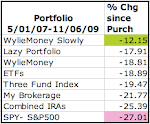- Cook cheap meals at home.
- Drive an economy car.
- Find affordable housing, even in expensive cities.
- Don't run the AC all the time.
- Don't spend more as your income rises.
- Live on as little as 25%-50% of your income.
A great quote from the article is:
"I would walk into (a work social event) in my $60 thrift-store gown and my $10 Payless shoes and I would feel like an actual millionaire, because I was..."
So are these strategies extreme?
Cook cheap meals at home. I've already written about tips for saving big time on food costs.
Drive an economy car. I drive a Civic Hybrid. We did buy it new, which was not frugal, but used hybrids were going for close to new prices if you could actually find one. We wanted one so we bit the bullet. We would have spent more money taking the commuter rail than we paid for the car and gas for the 80,000 miles we have put on it and maintenance since 2003, so not only do I enjoy it, it has been a very good deal for us.
Find affordable housing, even in expensive cities. When I got married, my wife and I moved from an expensive apartment near Cambridge to a home outside the city. The mortgage/insurance/real estate tax total was more than our rent, but not by much. After the tax write-off for our mortgage, which was more than the rent write-off that Massachusetts actually does allow, our housing costs were about the same. Rather than buy a more expensive home which our combined incomes would have allowed, we kept our housing costs low and doubled up on payments. After a couple of years we were able to refinance for a 30 year fixed loan at no points at 5.375%. Even with the subsequent spike in real estate taxes that naturally followed the reduction in federal taxes and thus a reduction in state and local tax revenue, our housing costs remain in line with what our rent would have been and we have built equity.
Don't run the AC all the time. We don't own an air conditioning unit. There are a few nights a year that this is not comfortable, but we survive.
Don't spend more as your income rises. Of course nobody wants to just scrape by and if your first salary is not great, you are going to increase your spending as you earn more. But it is up to you and your circumstance how much you increase your spending and if you are frugally minded, you will find that over time you can do more with less. So you can actually do more without increasing your overall expenses. If you lived just fine on your salary 10 years ago and work smart and get promotions, your income should be higher than what you needed to live on back then. Only you can assess if you can you get by on 25-50% of what you earn, but be honest!
I'm going with not extreme on these strategies. Sure I would not make some of the other choices discussed in the article, but I do other things not mentioned. Not buying cable saves me hundreds of dollars a year. Some call that extreme! I'll reevaluate it in my 40s...



2 comments:
If you live at this means until 40, and then retire, what do you do with your free time, given that you still plan on living at a similar means?
Esp if you don't have cable at that point...
You either wait 20 years for your friends to retire so you can hang out with them or you make retired friends 20 years your senior.
Hmm, yeah, I dunno if this is looking all that good. How about some insight into what we should do with all of that extra time?
Post a Comment